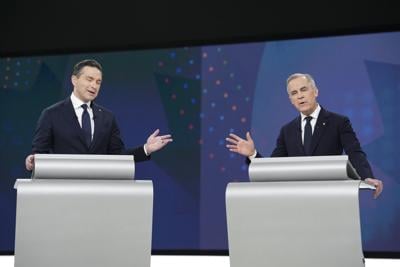With the English-language leaders’ debate now in the rear-view mirror, the 2025 federal election campaign moves into its most important phase: the closing week.
With the long week started and advance polls open, families and friends will gather, and politics is likely to come up. Nothing can cement political impressions quite like a spirited holiday argument over some food, too much chocolate and maybe some booze.
For Mark Carney and the Liberals, the English-language debate on Thursday was a chance to protect a narrow national lead; for Pierre Poilievre and the Conservatives, it was one of the last set-piece moments to flip the script before ballots are cast. So how did Canadians judge the clash and did the evening change anyone’s mind?
Abacus Data conducted a flash poll to gauge reaction. From 8:30 to 10 p.m. ET, we interviewed 1,200 Canadians whose primary language is English; 602 said they watched all or some of the debate.
Among debate viewers, 40 per cent judged Liberal Leader Carney to have delivered the strongest overall performance; 43 per cent said Poilievre came out on top, while 11 per cent gave the nod to Jagmeet Singh. At the other end of the scale, 29 per cent felt Pierre Poilievre had the weakest outing.
The headline number matters, but the intensity gap is what campaigns watch: 59 per cent said Carney’s debate performance left them with a positive impression, compared with 53 per cent who felt that way about Poilievre. If these initial perceptions hold, they suggest the Liberal leader not only won more fans but generated deeper enthusiasm — crucial for getting supporters to advance polls this weekend.
Did the debate actually move votes?
Flash polls are uniquely suited to measure intention shifts because they catch voters before next-day punditry reframes the narrative. In our sample, 23 per cent of viewers said the debate made them “reconsider” their vote choice; 73 per cent claimed it “confirmed” their existing preference. Only four per cent of viewers said the debate changed their vote.
- Vox Pop Labs
What’s Next
For Pierre Poilievre, the path to victory now runs through two tasks: lowering Carney’s personally favourable ratings and reinflating the “time for a change” sentiment that sagged since Justin Trudeau’s exit. Thursday’s debate offered an opportunity to do both and he spent a lot of time trying to. So far, evidence is that it hasn’t worked. The Conservative war room will hope repetition does what one debate could not: stitch economic anxiety to a desire for change that will cast doubt about Carney.
Carney’s challenge is simpler but no less risky: protect the narrow national edge and sprawling regional map the Liberals currently command. That means avoiding unforced errors while reinforcing an image of pragmatic steadiness.
Easter dinner tables will hum with talk of grocery bills, mortgage renewals and whether Canada can stay clear-eyed under an unpredictable neighbour. If Carney’s calm persona becomes the shorthand answer to that question, his party will enter the final 10-day sprint with the wind at their backs.
By Monday, we’ll have more numbers from another survey we are launching to confirm or refute these impressions. For now, the early signals suggest the English debate did not rewrite the race but likely nudged it a shade further in the Liberals’ favour — turning a campaign that was already Mark Carney’s to lose into one that, barring late-breaking turbulence, he seems increasingly poised to win.
Methodology
The survey was conducted with 1,200 adult Canadians whose primary language is English from 8:30 p.m. to 10:30 p.m. ET on April 17, 2025. A random sample of panellists were invited to complete the survey from a set partner panel based on the Lucid exchange platform.
The margin of error for a comparable probability based random sample of the same size is plus or minus 2.9 per cent, 19 times out of 20.
The data were weighted according to census data to ensure that the sample matched Canada’s population according to age, gender, educational attainment and region. Totals may not add up to 100 due to rounding.
David Coletto is founder and CEO of polling firm Abacus Data.
Error! Sorry, there was an error processing your request.
There was a problem with the recaptcha. Please try again.
You may unsubscribe at any time. By signing up, you agree to our and . This site is protected by reCAPTCHA and the Google and apply.
Want more of the latest from us? Sign up for more at our newsletter page.

























To join the conversation set a first and last name in your user profile.
Sign in or register for free to join the Conversation